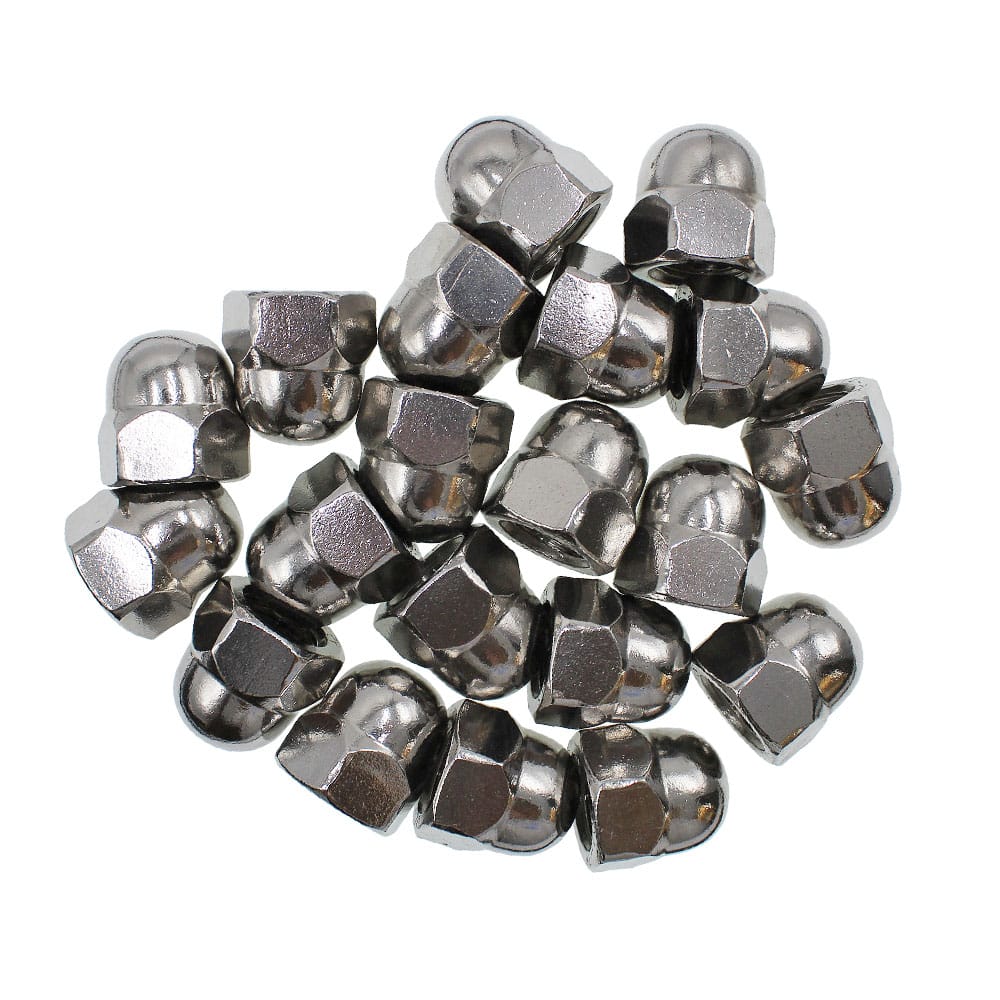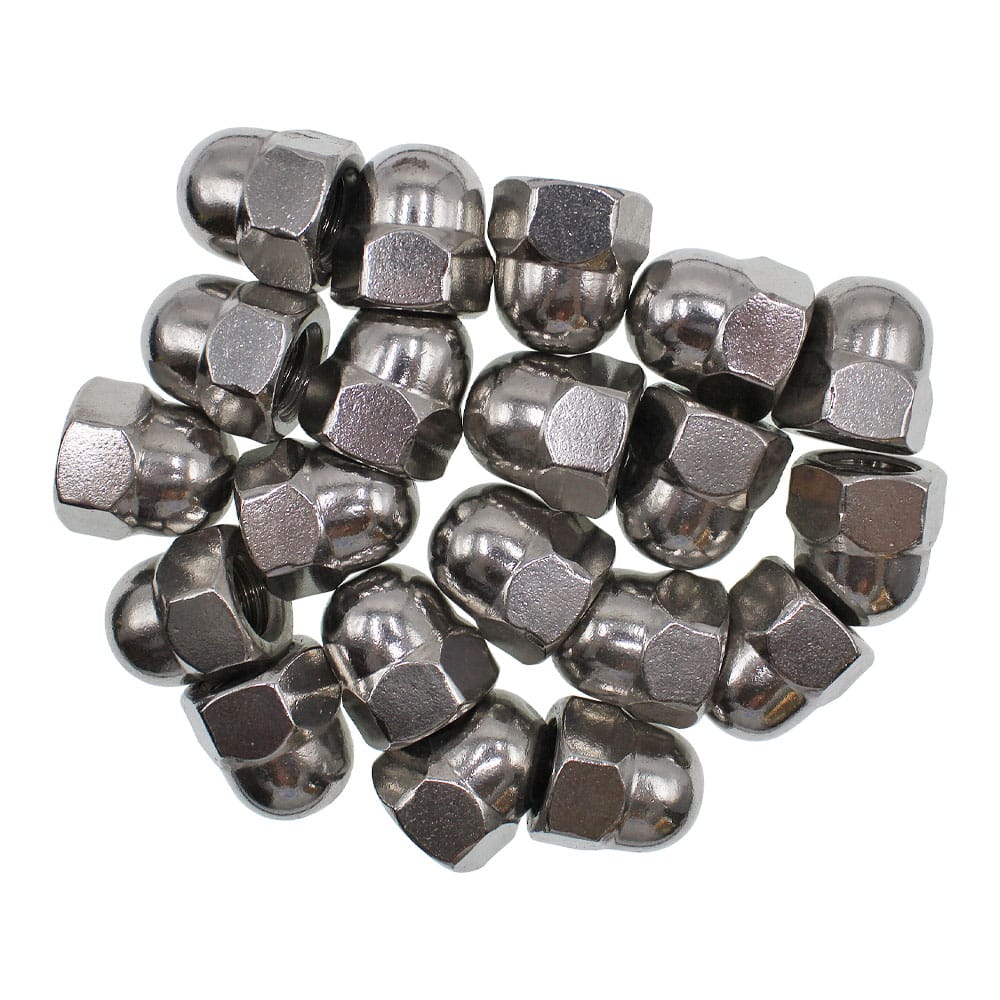- Massive Range
- FREE UK Delivery
- Rapid Dispatch
- Massive Range
- FREE UK Delivery
- Rapid Dispatch
- Massive Range
- FREE UK Delivery
- Rapid Dispatch
£9.99 – £13.99 inc VAT


This website is secured:
£ MULTIBUY SAVINGS – Order 3 For 10% Off
✔ Specialists In Rapid Shipments Of Any Size
✔ FREE UK Delivery Included
✔ Immediate Express Dispatch From Stock
✔ Tracked Delivery with Order Updates
✔ 30-Day Returns Accepted
@ ☏ Larger Pack Quantities Available
Looking for high-quality dome nuts that are both durable and versatile? Look no further than Speciality Metals’ M5 (5mm) Dome Head A2 Stainless Steel Dome Nuts! Made from 304 grade stainless steel, these nuts are not only sturdy and long-lasting, but also low maintenance and corrosion resistant. Whether you’re looking to secure mechanical components, fasten equipment or complete any number of other tasks, these dome nuts offer the ideal combination of strength and security. So why settle for anything less? Choose M5 (5mm) Dome Head A2 Stainless Steel Dome Nuts from Speciality Metals and experience the ultimate in precision and performance!

Top quality stainless steel dome nuts supplied straight from Warrington, UK.
Stainless Steel Dome Nuts with M5 (5mm) Dome Heads from Speciality Metals are an excellent choice for fastening applications. These stainless steel dome nuts are versatile and low maintenance, making them ideal for a wide range of applications. This material’s corrosion-resistant properties make it a secure choice, ensuring that they remain intact and functional under harsh conditions. These dome nuts feature precision engineering and an easy-to-maintain design, making them an ideal choice for any project requiring long-lasting fastening.
Standard nuts are not as aesthetically pleasing as dome nuts.
Key product details:
Speciality Metals are the best suppliers for you because:
Speciality Metals is a trusted UK based distributor of fasteners, sheet metal, flat bar and round tube. We specialise in rapid delivery to any location around the country. Our team of experienced, friendly staff are at hand at all times to process your order.
Zinc Coating: While more commonly used on carbon steel, zinc coatings can provide an extra layer of protection against corrosion. However, mixing zinc with stainless steel can lead to galvanic corrosion if not managed carefully.
Nickel Plating: Provides a hard and durable surface, as well as improved resistance against corrosion and wear.
PTFE (Teflon) Coating: Adds lubricity to the threads, making them easier to install and remove. It also offers some chemical resistance.
Black Oxide: This coating provides a layer of surface oxidation that helps to minimise light reflection and adds a mild level of corrosion resistance. It is more for aesthetic and minimal corrosive protection.
Xylan Coating: This is a type of fluoropolymer coating that offers high resistance to wear and corrosion. It is also resistant to chemicals and can be used in high-temperature environments.
Ceramic Coating: Provides high resistance to heat and minimises friction, but may be less durable under mechanical stress.
Passivation: Though not a coating, this chemical process is commonly used to remove free iron from the surface of stainless steel, enhancing its natural corrosion resistance.
Compatibility: Ensure that the coating material is compatible with 304 stainless steel and the application it will be used for.
Environment: Choose a coating based on the specific environmental conditions the nuts will be exposed to, such as high temperatures, corrosive chemicals or saltwater.
Mechanical Properties: Some coatings can alter mechanical properties like torque and tensile strength. This must be considered especially in load-bearing or high-stress applications.
Coating Thickness: The thickness of the coating can affect the dimensions of the nut, including its thread fit and torque requirements.
Cost: Special coatings can add to the overall cost of the fastener.
Regulatory Compliance: Ensure that the chosen coating meets all regulatory requirements, especially if the application is in a critical or regulated industry like healthcare, food processing, or aerospace.
Weak Acids: 304-grade stainless steel may handle weaker acids like acetic acid at room temperature, but this can depend on concentration and other environmental factors.
Strong Acids: Strong acids like sulfuric or hydrochloric acid are generally not recommended for contact with 304 stainless steel due to the high risk of rapid corrosion.
Organic Acids: 304 stainless steel has decent resistance to organic acids at moderate concentrations and temperatures.
Corrosion Resistance: 304-grade stainless steel is susceptible to pitting and crevice corrosion in chloride-rich environments, and acids often contain chlorides.
Concentration and Temperature: Higher acid concentrations and elevated temperatures typically accelerate corrosion. Always check compatibility charts for your specific conditions.
Stress Corrosion Cracking: 304 is vulnerable to stress corrosion cracking, especially in environments that are both acidic and chloride-rich.
Material Alternatives: For highly acidic environments, more corrosion-resistant materials like 316 stainless steel or specialised alloys may be more suitable.
Coating or Lining: While coatings can provide an extra layer of protection, they can also degrade under acidic conditions, so their suitability needs to be carefully considered.
Consult Manufacturer: Always consult the manufacturer’s guidelines or material compatibility charts for use in acidic environments.
Engineering Advice: For critical applications, it is advisable to seek the opinion of a materials engineer to assess the suitability of using 304-grade stainless steel dome nuts in acidic conditions.
Stainless Steel 304 dome nuts are generally reusable, but their reusability is contingent on several factors including the integrity of the threads, absence of deformation and lack of corrosion. If the nut has been torqued according to specifications and shows no signs of damage, it is more likely to be reusable. However, certain critical or safety-sensitive applications, such as in the automotive or aerospace sectors, may have guidelines or regulations that discourage or prohibit the reuse of fasteners. Before reusing, it’s crucial to inspect the nut for wear, corrosion or other signs of degradation. Cleaning is also advisable to ensure the nut is free from debris or contaminants. For high-stakes or safety-critical applications, it’s best to consult the manufacturer’s guidelines and possibly seek the opinion of a qualified engineer.
Yes, Stainless Steel 304 is commonly used in food-grade applications and is generally considered safe for direct contact with food. The material is known for its corrosion resistance and is non-toxic, making it a popular choice in the food and beverage industry. It meets the standards set by various organisations, such as the Food and Drug Administration (FDA), for use in food-processing equipment.
Surface Finish: For food-grade applications, the surface finish should be smooth to minimise bacterial growth and facilitate cleaning.
Cleaning and Maintenance: Regular cleaning is essential to maintain the food-safe status of the material. The dome nuts should be cleaned according to food industry standards to remove any food residues, oils or other contaminants.
Corrosion: While 304 is resistant to many forms of corrosion, it can corrode when exposed to certain aggressive substances found in some foods, like high concentrations of salt or acids. Regular inspection is advisable.
Certifications: Look for dome nuts that come with food-grade certifications to ensure they meet the necessary safety and hygiene standards.
Regulations: Always check local, state and federal regulations to ensure compliance with food safety standards.
Temperature and Pressure: Ensure that the 304 dome nuts can withstand the temperature and pressure conditions of your specific food-grade application.
Compatibility: Make sure the material is compatible with the other components in your system, especially if they are also in contact with food.
Installing Stainless Steel 304 dome nuts typically doesn’t require specialised tools and can often be done with standard tools commonly found in a toolbox. Here are the tools you may need:
Wrench or Spanner: A wrench or spanner of the appropriate size is usually the primary tool for installing dome nuts. You may use an open-end, box-end or adjustable wrench.
Socket Set: A socket wrench set can also be very useful, especially for tighter spaces where a regular wrench may not fit.
Torque Wrench: For applications where the torque needs to be precisely controlled, a calibrated torque wrench is essential.
Pliers: In some situations, pliers might be used for a quick tightening or loosening, although they do not provide the precision of a wrench or torque wrench.
Allen Keys or Hex Wrenches: Some dome nuts come with an internal hex drive, requiring an Allen key or hex wrench for installation.
Screwdrivers: In some cases, especially for smaller dome nuts, a flat-head or Phillips screwdriver may be used to hold the opposite end of the bolt or screw in place while tightening the nut.
Threadlocker or Anti-seize Compound: Depending on the application, you may also need a thread-locking or anti-seize compound to ensure that the nuts stay in place or to prevent galling of the threads.
Rags or Cleaning Cloths: To wipe away any lubricants or debris before and after installation.
Safety Gear: Always remember to use appropriate safety gear like gloves and safety goggles to protect yourself during the installation process.
Measuring Tools: A caliper or other measuring tool may be useful for ensuring that you are using the correct size of dome nut for the bolt or screw.
Check out our blogs discussing A2 stainless steel dome nuts. It will prove a useful read to help you to make an informed decision on which material would work best for you.
We are also very proud of our ever expanding YouTube channel.
Our goal for our blogs, videos and help guides is to answer as many questions as possible to help to explain the possibilities of mesh to our customers. Contact us today if you have any questions at all. We are always really keen to help in any way that we can.
We are also very proud of our highly popular eBay store, check us out there too.
Thank you for checking out our product.


Speciality Metals
Unit 1, Farrell Street, Warrington,
Cheshire, WA1 2WW, United Kingdom
Quick Links
Payment Options
